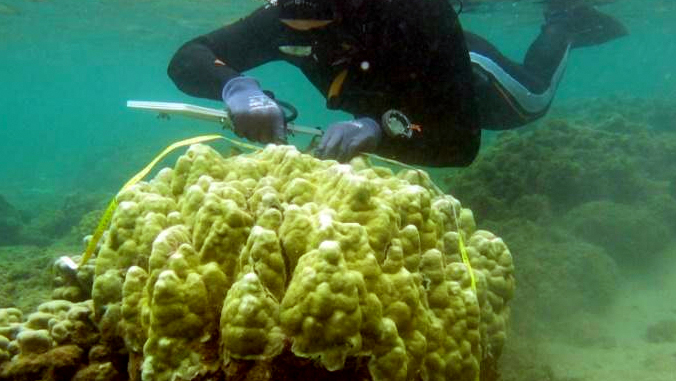
A team of researchers from the University of Hawaiʻi at Mānoa School of Ocean and Earth Science and Technology and the Bernice Pauahi Bishop Museum conducted a study of coral resiliency that showed some corals are better able to tolerate heat than similar corals tested in the 1970’s. But scientists say it will not be fast enough to fight off rising sea temperatures.

The scientists replicated the identical experimental system, methodology, coral species, collection site, and even brought in one of the original researchers, Steve Coles, adjunct faculty at the UH Mānoa Hawaiʻi Institute of Marine Biology (HIMB). The Hawaiian corals from Kāneʻohe Bay, Oʻahu showed differences in coral bleaching temperature either because of changes in physiological processes (acclimatization) or because of natural selection for the survival of more temperature tolerant corals (adaptation).
“Until now, it had not been determined how long these processes take or if this change can occur at a pace rapid enough to adjust to the frequency and severity of current elevated temperature events,” said Kuʻulei Rodgers, study co-author and principal investigator of the Coral Reef Ecology Lab at HIMB. “From prior temperature-related research and results of the extensive 2014–2015 bleaching event, we do know that this change is not occurring at a pace rapid enough to adjust to the frequency and severity of current elevated temperature events.”
A pivotal place in history
Climate change is increasing at an alarming rate including the warming and chemical changes in the ocean. The ocean drives weather and climate, stabilizes the temperature, generates most of the oxygen in the atmosphere and absorbs much of the carbon dioxide.
The International Panel on Climate Change, a group of renowned scientists from over 40 countries recently announced their predictions based on tens of thousands of scientific papers. They predict that if humans do not make drastic changes in reducing carbon emissions within the next 12 years 99 percent of the world’s coral reefs will be gone in one more generation.
“We are currently at a pivotal place in history where the decisions we make or fail to make will determine the fate of our reefs,” said Rodgers. “We need to fully understand the mechanisms and responses to develop solutions, define accurate predictions and advance management efforts to protect and conserve coral reefs.”
Read the full story on the School of Ocean and Earth Science and Technology website.
—By Marcie Grabowski

